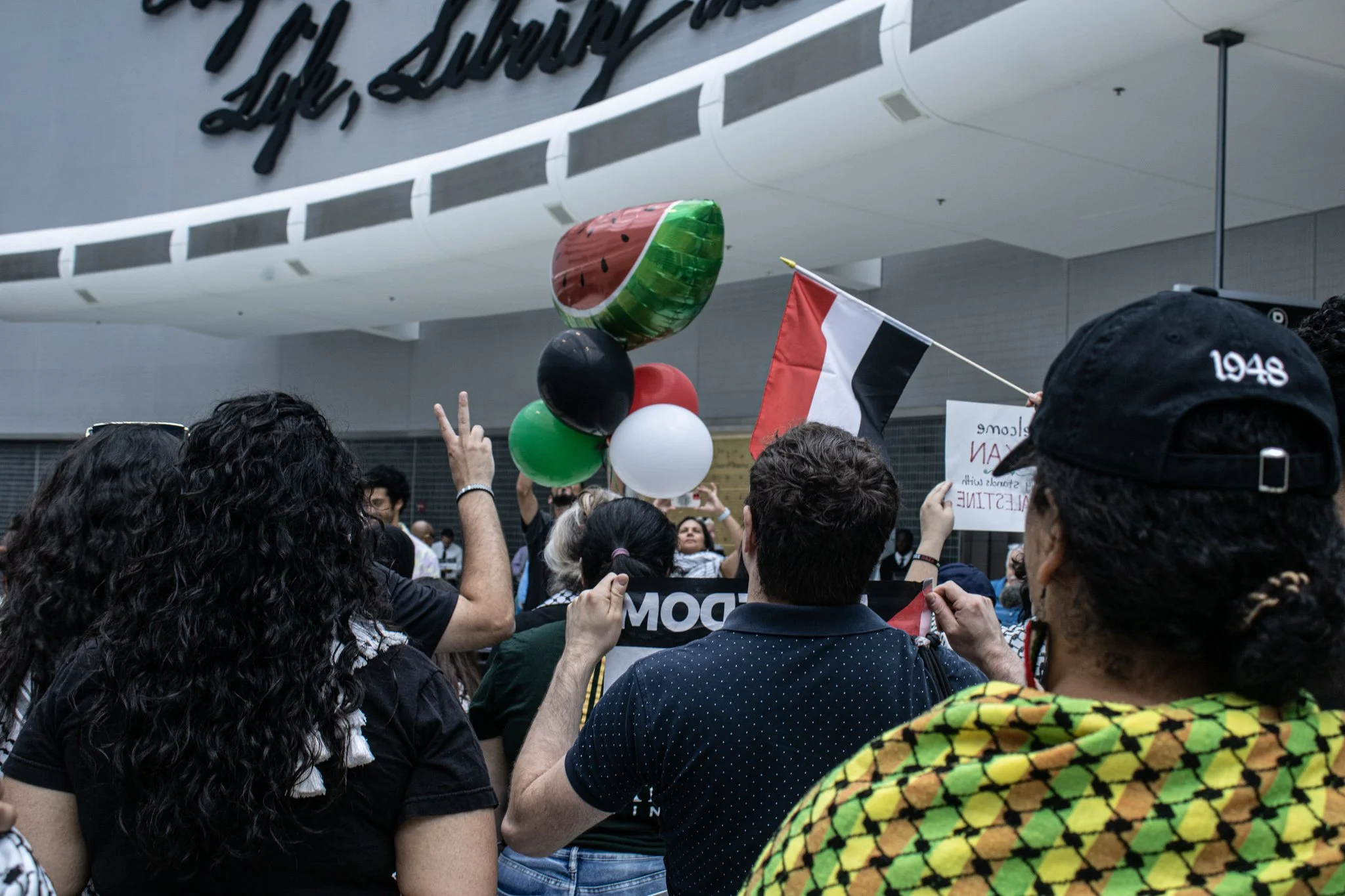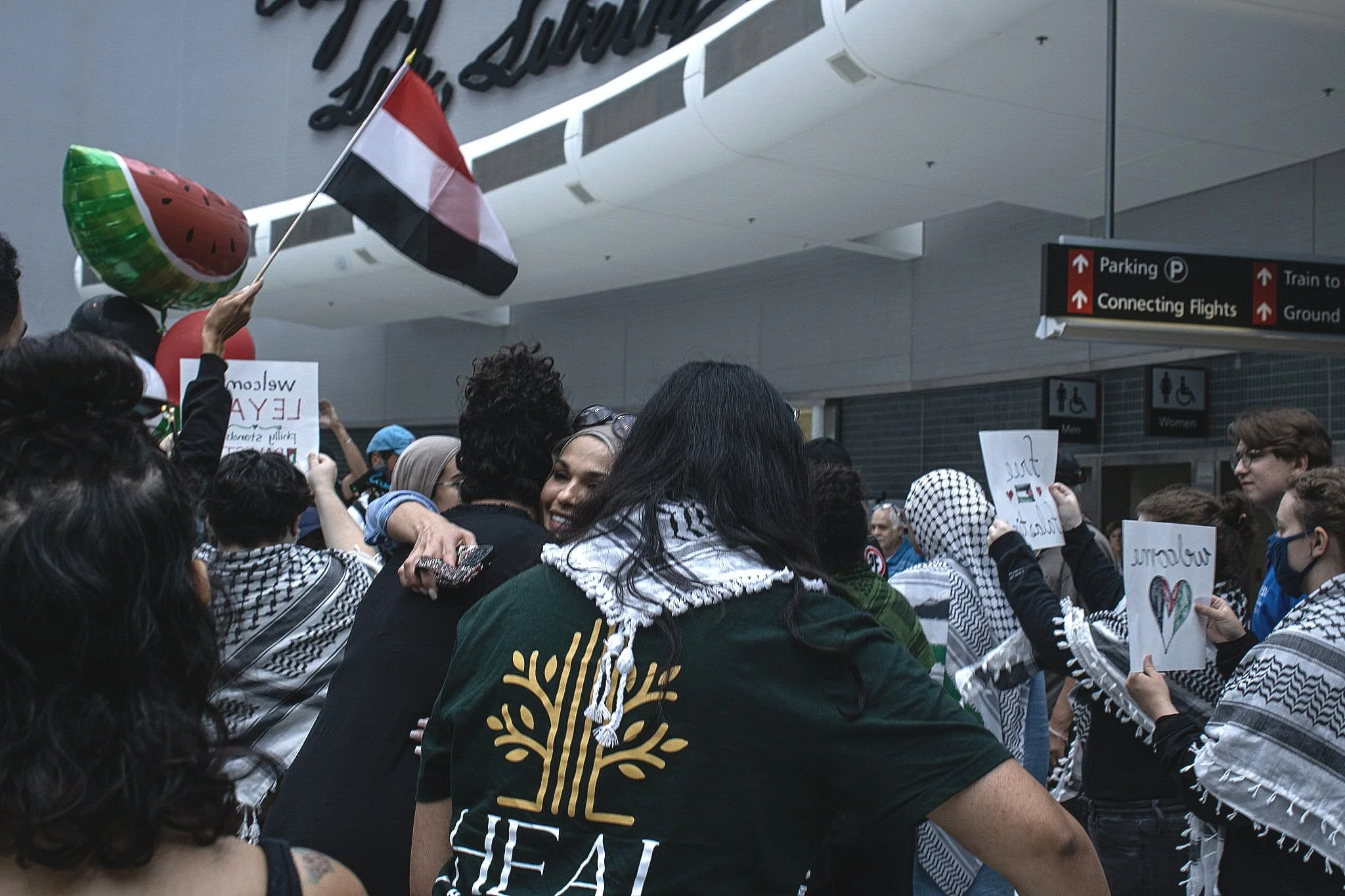Philadelphians Gather at Airport to Welcome 13-Year-Old Gazan Girl, Leyan Abu Alatta, Arriving for Medical Treatment
Lauren Abunassar
On Saturday, Philadelphians gathered in the International Arrivals Hall at the Philadelphia International Airport to welcome Leyan Abu Alatta, a 13-year-old Palestinian girl who lost her leg when Israel bombed her home in Gaza. Abu Alatta arrived in Philadelphia with her mother, brought to the U.S. by Health, Education, Aid, and Leadership (HEAL) Palestine, a nonprofit humanitarian organization dedicated to providing healthcare and educational support to Palestinian youth. With her right leg now amputated as a result of her injuries, Abu Alatta will be treated at Shriners Children’s Hospital in Philadelphia, where she will receive an artificial leg and medical treatment. Israel’s bombardment of Gaza, which began on October 7, 2023, and has continued relentlessly over the past 9+ months, has killed over 38,000 civilians, with thousands more still buried, uncounted, under the rubble.
Palestinian teenager Leyan Abu Alatta of Gaza arrived at the Philadelphia International Airport on Saturday. She will be treated at Shriners Hospital for Children for injuries she sustained when Israel bombed her house. Her leg has been amputated in order to save her life. Photo credit: Lauren Abunassar
According to HEAL Palestine representative Bassam Kayed, Abu Alatta was chosen for sponsorship via a lottery system. HEAL Palestine will provide ongoing support to Abu Alatta while helping to organize transportation, healthcare appointments, educational resources and more. “Everyone has come together here for Leyan,” Kayed said in an interview with Al-Bustan, gesturing to the packed hall of people. “We want her to feel this support.”
Abu Alatta made the long journey from Egypt to Doha to Philadelphia. Exhausted but smiling, the teenager graciously took photos with supporters who welcomed her with gifts, signs, balloons, and applause that reverberated throughout the airport. Philadelphia resident Boaz Kim was one community member who greeted Abu Alatta, offering bags of candy as a welcome gift. “Knowing that [Leyan] is coming here from an active genocide funded by the U.S., it was important for us to come and show her that not everyone here supports this,” Kim told Al-Bustan.
A crowd filled Philadelphia Airport’s International Arrivals’ Hall, waiting to welcome Abu-Alatta with cards, signs, well wishes, and gifts. Photo credit: Lauren Abunassar.
“I am Palestinian. But even before that I’m a human being,” said Alla Ajaj, who also came out to the airport to greet Leyan. “As an American, I think about the fact that our country is funding this [genocide]. Our own government is collapsing and yet we still can afford this?”
Above, Leyan Abu Alatta, seated in a wheel chair at Philadelphia International Airport, shortly after arriving. Photo credit: Lauren Abunassar
Intent on offering tangible support to those impacted by the genocide, HEAL Palestine was founded by Palestine Children’s Relief Fund co-founder, Steve Sosebee, in January. Headquartered in Kent, Ohio, HEAL Palestine has focused especially on helping Gazan children while establishing a global humanitarian presence. Operating field hospitals and schools in Gaza, the organization also aims to advance education and broader humanitarian support for Palestinians. Abu Alatta is not the first child to be sponsored for treatment by HEAL. In June, the nonprofit brought four-year old Talin and her mother and two siblings from Egypt to Philadelphia. Talin also received treatment at Shriners for serious injuries to her legs sustained during a bombing that killed their 12-day old sister. Her younger brother lost his leg in the same bombing. In May alone, HEAL Palestine also brought a 14-year-old to Cleveland for medical treatment, a seven- and six-year-old for treatment in Florida, a 12-year-old for treatment in St. Louis, and more.
Still, many of Abu Alatta’s supporters at the airport on Saturday expressed a desire to see the U.S. healthcare system doing more to provide aid to Gazan children. One Philadelphia healthcare worker originally from Yemen, who wished to remain anonymous, came to welcome Abu Alatta and shared her desire to see American healthcare workers rallying around Palestine the same way many American teachers have. “It’s a war on children,” she told Al-Bustan. “Why does it take a group of people [at the International Court of Justice] to validate what people have been saying for decades? That this is genocide. Are we the slaves of years ago, begging to be seen as human? Why aren’t we taking in more children? Medically treating more children? We have to learn from history. Haven’t we seen this before? In South Africa. In Iraq? In Syria? In the Congo?”
Philadelphians adorned with keffiyehs told Al-Bustan that they wanted to make the young Gazan teenager, Leyan Abu Alatta, feel welcome upon her arrival. Photo credit: Lauren Abunassar
She was not alone in her expressions of frustration. Palestinian American Lina S., who asked her last name not be shared, told Al-Bustan she was inspired to come to the airport with her children to greet Abu Alatta because of stories she has heard from her Palestinian family and because of the news coming out of Gaza. Both of her grandparents, she said, were forced to leave their homes in 1948 when the state of Israel was founded. Today, Lina still has family in Jerusalem and says she constantly hears stories from them about Israeli violence against Palestinians, including imprisonment and kidnapping. The horror of these stories has been underscored watching Israel’s brutalization of Gaza unfold on the news. “We see it all and then we’re lied to and told it’s a defensive battle,” Lina said. “But then we see these kids [like Leyan] losing limbs, not to mention facing such mental health struggles, we want them to see they’re loved and that people here care about them.”
The crowd at Philadelphia International Airport cheered Leyan’s arrival as they raised a balloon shaped like a watermelon, a symbol of Palestinian resistance. Photo credit: Lauren Abunassar
Reverend Hannah Capaldi of the Unitarian Society of Germantown and Reverend Linda Noonan of St. Paul’s United Church of Christ expressed similar sentiments. Noonan published an essay in October about her own experiences fleeing the West Bank in 2023 following the October 7th Hamas-led ‘Al Aqsa Flood.’ In her essay, Noonan credited the “radical hospitality” of Palestinians who risked their lives to help Noonan and another colleague get back to the U.S.
Capaldi, meanwhile, wondered what Abu Alatta must be thinking, arriving in a country responsible for supplying many of the weapons raining down on Gaza. “I’m here to show a warm welcome to a child who never should have had to leave her home just to receive medical treatment,” Capaldi told Al-Bustan. “I would expect [Leyan] to arrive terrified, knowing this is the country that made bombs that dropped on her home. We want to be a part of a warm welcome so that she’s not afraid.”
In April, Save the Children reported that more than 13,000 children in Gaza have been reported dead since Israel launched its bombardment on October 7th. This constitutes over 2% of Gaza’s child population. This is not counting the mass injuries reported or those who are still buried under the rubble. It is also not counting the children who are currently facing catastrophic food insecurity and starvation, with UNICEF screenings finding acute malnutrition in children under five has jumped from 13 to 25 percent.
The crowd that gathered to welcome Abu Alatta on Saturday seemed all too aware of the statistics. “Not everyone can be evacuated,” said one attendee at the reception, Iman, who asked to be identified by her first name only. “But we bring the kids we can bring and when we do, we want to share and spread joy and love as a community.”
***
Lauren Abunassar is a Palestinian-American writer and journalist. A Media Fellow at Al-Bustan, she holds an MFA from the Iowa Writers’ Workshop and an MA in journalism from NYU. Her first book Coriolis was published by University of Arkansas Press as winner of the 2023 Etel Adnan Poetry Prize.





